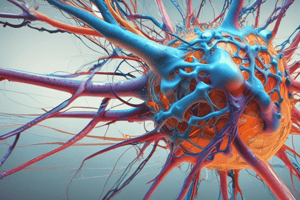Podcast
Questions and Answers
What effect does sympathetic stimulation have on bronchioles?
What effect does sympathetic stimulation have on bronchioles?
- Causes spasm in bronchioles
- Dilates bronchioles (correct)
- Constricts bronchioles
- Has no effect on bronchioles
Which statement accurately reflects the effects of parasympathetic stimulation on heart muscle?
Which statement accurately reflects the effects of parasympathetic stimulation on heart muscle?
- Has no effect on heart rate
- Decreases heart rate (correct)
- Causes irregular heartbeats
- Increases heart rate
What is the impact of sympathetic stimulation on blood vessel behavior?
What is the impact of sympathetic stimulation on blood vessel behavior?
- No action on blood vessels (correct)
- Causes dilation of blood vessels
- Reduces blood vessel length
- Increases blood vessel permeability
Which of the following describes the effect of sympathetic stimulation on heart muscle?
Which of the following describes the effect of sympathetic stimulation on heart muscle?
In what way does parasympathetic stimulation differ from sympathetic stimulation regarding blood vessels?
In what way does parasympathetic stimulation differ from sympathetic stimulation regarding blood vessels?
What physiological response is prompted by sympathetic stimulation in terms of respiratory function?
What physiological response is prompted by sympathetic stimulation in terms of respiratory function?
Which of the following effects would be expected if parasympathetic stimulation was removed from the heart muscle?
Which of the following effects would be expected if parasympathetic stimulation was removed from the heart muscle?
What happens to blood vessels when sympathetic stimulation occurs?
What happens to blood vessels when sympathetic stimulation occurs?
How does the response of the heart muscle to sympathetic stimulation primarily influence overall circulation?
How does the response of the heart muscle to sympathetic stimulation primarily influence overall circulation?
What occurs to the bronchioles when there is an absence of sympathetic stimulation?
What occurs to the bronchioles when there is an absence of sympathetic stimulation?
Flashcards are hidden until you start studying
Study Notes
Sensory Nervous System
- Nerves transmit impulses from the body to the Central Nervous System (CNS) and to effector organs.
Efferent Division of Peripheral Nervous System
- Composed of the autonomic nervous system (ANS) and somatic nervous system.
- Responsible for transmitting signals from CNS to effector organs.
Autonomic Nervous System (ANS)
- Divided into sympathetic and parasympathetic systems.
Sympathetic Nervous System
- Stimulates activities of effector organs (except digestive organs).
- Responsible for fight-or-flight response, preparing the body for action.
Parasympathetic Nervous System
- Inhibits activities of effector organs (except digestive organs).
- Promotes rest and digestion, conserving energy.
Dynamic Balance
- The balance between sympathetic and parasympathetic branches is crucial for homeostasis.
Preganglionic Neurons
- Originate in the brain or spinal cord, playing a vital role in the ANS.
Key Functions
- Respiratory System:
- Sympathetic: Dilates bronchioles.
- Parasympathetic: Constricts bronchioles.
- Heart Muscle:
- Sympathetic: Increases heart rate.
- Parasympathetic: Decreases heart rate.
- Blood Vessels:
- Sympathetic: Causes constriction.
- Parasympathetic: No significant action on blood vessels.
Studying That Suits You
Use AI to generate personalized quizzes and flashcards to suit your learning preferences.



